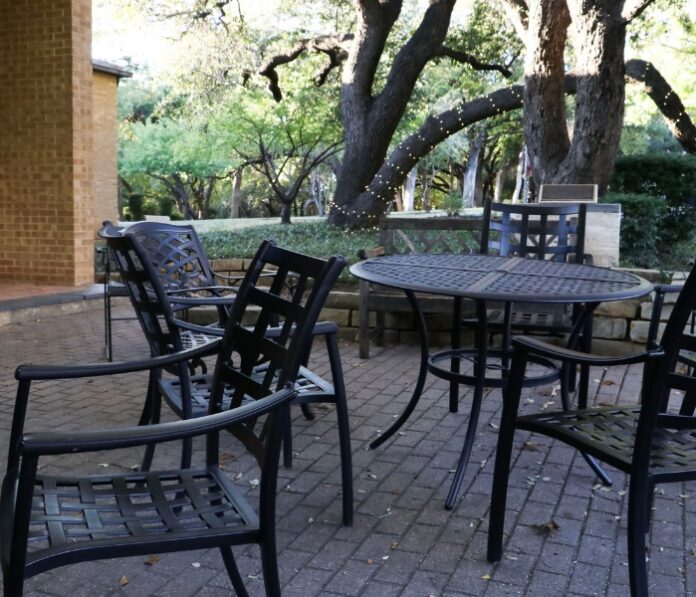This semester, a new hire for the department of education and classical learning, Dr. Erik Ellis, started a Latin group to meet weekly and speak in conversational Latin.
The “Mensa Latina,” led by Ellis, meets Thursdays at 1 p.m. in the Constantin Garden, where a diverse group of undergraduates, faculty and staff spend their lunch hour speaking entirely in Latin for the sake of improving their conversational skills in the language.
Ellis began his first semester at UD in August as an assistant professor of education and classical learning. Although not part of the classics department, Ellis has two degrees in classics and a doctorate in post-classical Greek and Latin. Additionally, he has a background in teaching Latin to K-12 students and has been studying Latin since he was in high school.
When asked why he decided to start the group, Ellis said, “I think in most Latin classrooms there’s not an expectation that students will become fluent readers of Latin or participate in what I call ‘Latinity’— the culture or tradition of Latin as a language, as a literature, as something like a global phenomenon. It’s [treated as] a subject to be studied rather than a tradition to be participated in… I realized that I wanted to find a methodology that actually makes my students enthusiastic about participating in ‘Latinity’ and makes them want to participate in the thing rather than [only] study it.”
Ephraim Robinson, freshman drama major, has studied Latin for five years and is one of many students who have attended the Mensa Latina.
When asked about the value of speaking Latin as if it were a vernacular language, Robinson said, “A lot of people who do classics are quite proficient in the grammatical method [of studying Latin], but it’s not accessible for them to use. It’s always very analytical and a self-conscious process, doing classics in the grammatical method. So I think it’s important to learn how to really bring alive that thing that you’ve learned and to apply it.”
Martin Lane, freshman classical philology and philosophy double major, has also attended the Mensa Latina. To the same question, he said, “I actually think that the biggest reason is so that you can feel the Latin while you read aloud. Also, so that you can read faster, because it’s much faster if you can read it without translation.”
Robinson also stressed the value of engaging with Latin as a living language.
“I also think that it’s much more rewarding to develop a Latin brain that works within Latin, rather than just working Latin into English,” said Robinson. “You don’t get the same enjoyment out of reading if you’ve just done the grammatical method, because you don’t have the ethos of the people and the language to really inhabit the text.”
Fr. Joseph Van House, affiliate assistant professor of theology, has also attended a few meetings of the Mensa Latina.
“One of the things I really enjoy is that Dr. Ellis is a very good teacher of it,” said Van House. “As he is a lively speaker, he’s very impressive.”
When asked why one might want to join a Latin conversation group, Van House said, “For me, by being challenged to produce things orally, I become a much better reader.”
Since Latin is considered a “dead” language, there are few opportunities to practice speaking it as if it were a common language. As such, Ellis wishes to encourage participation in a spoken Latin tradition.
“A lot of people say Latin is a dead language, or it’s impossible to speak Latin, or young people don’t like Latin,” said Ellis. “But I find that Mensa Latina as a cultural practice is a way of demonstrating that this is a vital tradition that can touch lives and enrich people’s conceptions of reality. You realize that you’re participating in something that is thousands of years old but still new, and that you can still learn from and express yourself in that medium.”
Even though Latin is considered a dead language, events as recent as the Second Vatican Council have been conducted entirely in Latin, showing the spoken tradition is not as “dead” as some think.
Moreover, conversation hours in foreign languages are not a new phenomenon at UD. The French and Italian Clubs have hosted their own events for students of the respective modern languages to speak in conversation, and the Spanish club hosted a movie night this semester for a similar purpose.
The Mensa Latina fits right in with the other foreign language club activities at UD.

